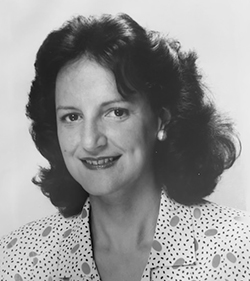Bibiana Grau, U.S. Hispanic Market figure, passes: A legacy and a tribute.
June 13, 2025

Bibiana Grau, who was a well-known player in the U. S. Hispanic Market and part of the multicultural communications scene, passed away in New Jersey recently. From industry founding father Eduardo Caballero to notable players like the late Jackie Bird, at Hispanicad.com we proudly recognize the legacy of valued individuals whose work has left a mark. Their consequential contributions and illustrious careers helped open a path and created an early awareness of what we do. Reckoning wisely—and humbly— with their experiences can only help make us better. Here’s but a brief part of Bibiana Grau’s impressive footprint. — Gene Bryan / HispanicAd
Bibiana Grau, (Havana, December 2, 1944 — New Jersey, May 28, 2025), an early Media Director, ad agency owner and television sales leader, passed away recently in New Jersey leaving behind the marks of a successful career that spanned nearly forty years. Some of her colleagues and relatives remember her here with pride and positivism.
“Bibiana was one of those whose contributions —in the early stages of the Latino wave— became instrumental in forming the Spanish language advertising and media landscape that would be known as the Hispanic Market,” said Cristina Schwarz, President/General Manager TELEMUNDO 47, New York. “She had been quite a powerhouse at Conill Advertising,” added Schwarz.
“Bibiana was the full-package: She had way above-average intelligence, possessed an incredibly sharp wit and her can-do disposition and competitiveness were ever-present,” recalled Daisy Expósito-Ulla, industry leader and head of d expósito & Partners, who also remembers “Bibiana’s confident persona, outgoing personality and uncanny ability to express her dancing skills by doing a mean Cuban guaguancó!” Expósito-Ulla recalls: “I was a young girl when Bibiana joined Alicia and Rafael at Conill. It was a time of ebullition and Conill was a vortex of a brewing market explosion those years —just think of Bibiana in Media hiring Gloria Pimentel Constanza who would later on write her own success story! These were heavy players. Conill was like a school for many professionals over those years: Liz Castells, Nancy Tellet, Fernando Fernández, Sandra Alfaro, Tony Ruiz. Many remember Bibiana as a ‘Maestra’.”
“She had helped hire me at Conill but when the agency was sold to a conglomerate, we weren’t happy with the new direction,” said Fernando García. “I told Bibiana I had an offer from an agency in California and she said: ‘Don’t be silly, talk to the MetLife client and I’m sure he’ll give you the account so you can open an agency here!’. It turned out she was right and soon enough a ‘business marriage’ would take place as Grau & García was born and would operate for five years. She was a great influence and a constant inspiration in my life, our families were really close and she was full of life — to learn of her passing saddens me,” concluded García.
From Media Director at Conill to co-owner at Grau and García, Grau would move to spend her last years in the business as the successful Local Sales Manager at New York’s WNJU Channel 47. Manuel Martínez, the former President/General Manager of Telemundo 47, recalls those days: “As with everything having to do with Bibiana, there was a nice twist to the story as she had been instrumental in hiring me to work for her Media Department at Conill back in 1980 —when I was merely a venturesome young man daringly looking for a career in communications! Then, as destiny would have it, it was I who would sign her for her last job, at TELEMUNDO 47.” Martínez remembers Bibiana as “very smart, irreverently funny, a great mentor and a bit crazy in just the right way!”
Denise Rover, who has been with Telemundo for more than thirty years, remembers Bibiana: “It must have been around 1992. She was alive, energetic and a bit eccentric. At black-tie events, she would be one of the first to hit the dance floor!”
A life of exile, adventure and re-invention
She was born in an intellectual household of aristocratic lineage —a mother of French, Lebanese and Spanish background and a father born in the Dominican Republic as a result of his family’s forced exile during Cuba’s turbulent struggles for independence. It was an abode where canonic literature held equal sway with the poetry of Martí and Heredia, and Chopin’s sonatas filled the ambiance with Celia Cruz and La Sonora Matancera. While her mother wanted Bibiana to become a concert pianist, the mischievous little girl would sabotage the effort by putting toothpicks between the piano keys.
However, the Cuban Revolution of 1959 came to shake up Bibiana’s youth even though her emotional and intellectual resourcefulness provided anchoring and inventiveness: after joining the government’s literacy campaign as a juvenile instructor in the countryside, she found an entry position at the then famous Cuban Film Institute (ICAIC) of those early years — practically an oasis of creativity in an increasingly macho-militarized society. The stint allowed her to be carried by her boundless curiosity to learn, extrovertedly rub elbows with intellectuals and artists from eastern bloc countries, and eventually be assigned to Czechoslovakia, arguably the most open of those countries at the time of the Cold War.
However, disillusioned by an increasingly repressive political environment in Cuba, she married young and soon left the unrest of the island as an exile, settling first in Union City, N.J. and then in New York City. “She landed her first job selling appliances but, as you can imagine, it lasted just two days!,” recalled amusingly Kevin Tighe-Martínez, her godson, and her former media colleague and “comadre” Carolina Martínez, both indispensable contributors to this story.
What Cuba had lost in Bibiana had been destined to become one good gain for the burgeoning marketing and advertising industry in the U. S. Hispanic Market — one of its valued early builders.
Rest in peace, Bibiana Grau!



























